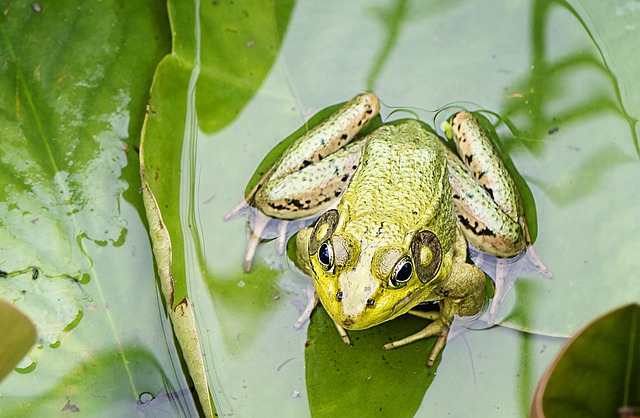As summer approaches, it is a rest well-deserved to hang around in natural bodies of water. But, wait, mosquitoes also love to spawn on these marine areas!
What’s worse, these insects bring life-threatening risks to our health! And, at the same time, just take in the scenic view and the calm of nature.
If you want to fully enjoy relaxing in these bodies of water, you might want to control these nuisance mosquitoes by introducing their biological enemies.
Important Note: If you're tired of pests and want a reliable solution, then you should definitely consider seeking help from a professional pest control company. DIY solutions can be effective, but if you're dealing with a significant pest infestation, you don't want to rely solely on DIY methods. Pest control companies typically don't charge huge fees. You can fill out this form to receive free quotes from the top local pest control companies, and compare the quotes and see for yourself. Then, finally, your pest problems will be eliminated for good.
One such animal species is the frog and its younger form, a tadpole.
In this article, we will delve deeper into the relationship between frogs and mosquitoes in the ecosystem.
This time, you’ll learn that tadpoles do eat mosquito larvae, and there’s more than enough reason behind that.
Let us check this one.
Biological Control of Mosquito Larvae
Let us just put it out there: mosquitoes are vectors of harmful diseases. Mosquitoes are known to carry malaria, a deadly disease transmissible to humans.
It goes to say that mosquitoes remain a significant health problem, especially in tropical and subtropical countries worldwide.
Besides malaria, mosquitoes carry life-threatening diseases such as dengue fever, yellow fever, chikungunya, etc.
Developing effective ways to manage mosquitoes by using their ‘natural enemies’ has been helpful as ‘biological control’ to the increasing population of these deadly insects.
So, what do we mean with this ‘biological control’? Here, biological control refers to introducing a different organism to suppress the population of mosquitoes.
And, one of these control techniques is to introduce tadpoles, and later on, frogs; the same can be done by introducing spiders to control the mosquitoes.

Frogs are an essential part of the ecosystem with pest control management to insects such as mosquitoes.
There is a strong perception that introducing amphibians in a largely-dominated mosquito population will likely reduce the population of mosquitoes.
When frogs are introduced into the breeding habitats of mosquito larvae, such as in ponds, puddles, and tanks, they primarily prey on mosquito larvae.
Over time, frogs reduce the vector population of these deadly insects.
Biology of Frogs
Frogs are sensitive to any change in the environment. These amphibians breathe through their skin, making them adaptable to any living condition.
Frogs mostly spend their lives on aquatic habitats such as moist leaves, rocks, and logs. Tadpoles are known as omnivores because they prey on microorganisms, algae, protozoans, and other insects as well.
While adult frogs are known to be carnivores, and they primarily consume arthropods such as mosquitoes.
These amphibians thrive in aquatic environments where mosquitoes also live. As such, there is a predator-prey competition happening between the two species.
Most likely, frogs would prey on mosquito larvae as one of their food sources in this moist environment.
Studies have shown that approximately 50 frogs can keep an acre of rice paddies free of mosquitoes. Thus, frogs can check the population of these harmful insects.

Tadpoles and Mosquito Larvae
Tadpoles co-habituate with a range of mosquito larvae. Tadpoles love to consume mosquito larvae, while adult frogs reduce the mosquito population by preying on adult mosquitoes in return.
Studies have shown that tadpoles prey on mosquito larvae because they are the only available food sources for these tadpoles. As such, their predator instinct pushes them to consume mosquito larvae as their prey.
When they grow and survive as tadpoles, these species have competition in the food chain.
Essentially, who can get to the food source first, the population of an organism will likely be diminished. Tadpoles constantly need food to grow and survive.
Mosquito larvae need four times to molt to become adult mosquitoes.
As such, tadpoles have a higher chance of preying in mosquito larvae. In this way, tadpoles significantly reduce the growing population of mosquitoes in or near your area.
Do Frogs Eat Mosquito Larvae?
The simple answer to this question is: yes, frogs do eat mosquitoes & their larvae. Suppose tadpoles are placed in an environment where mosquito larvae also thrive.
In that case, the two could very well be enemies against each other through the competition of food sources; frogs have an advantage over mosquitoes.
Through the sheer concept of the survival of the fittest – mosquitoes will finally meet their match in the food chain.
Tadpoles grow faster than mosquito larvae. Obviously, they consume mosquito larvae at a faster rate.
Because of this increased time in a tadpole’s complete metamorphosis, they have a greater chance of consuming mosquito larvae through competition.
That being said, frogs do eat mosquitoes. As mosquitoes continue to spread life-threatening diseases around the world, introducing frogs to their environment is critical in keeping their numbers low.
Even some species of mosquitoes are resistant to insecticides, thus controlling mosquitoes with frogs is critical.
Final Thoughts
We share the same sentiments that mosquitoes are vectors of dangerous diseases.
And, controlling their increasing number is critical in preventing the spread of these life-threatening diseases.
And, frogs would love to feast on mosquitoes, which do an excellent job controlling their population.
One thing you can do is to research even further on how frogs act as biological controls in targeting mosquitoes.
Educate yourself and your family about this matter. We’ll know that it will save you tons of stress and trouble soon.
Thanks for reading!
